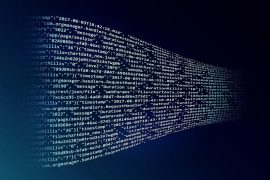Big data has helped an innumerable amount of companies, but maybe no more than artificial intelligence. AI needs information and training in order to work effectively and productively. Luckily, there is no greater purveyor of information than big data.
The amount of data that big data provides is enough for artificial intelligence to develop at faster and faster rates. All of the data involved helps AI to understand what it needs to know and what it can throw out.
This happens one way: big data combs through the data sets to ensure that only useful information is added. Artificial intelligence that has better data will perform better overall. Combing through the data can also be less complicated thanks to big data.
Artificial Intelligence (AI) and Machine Learning (ML)
Artificial Intelligence (AI) and Machine Learning (ML) are among the most discussed topics of the IT industry these days. Despite the numbing buzz around AI and ML, it’s more than just an abstract idea or hypothetical application. AI and ML are already powering tools that can give your business decision-making processes a massive upgrade. The technology is here, it’s already proving itself in the market, and it’s increasingly being built with business in mind. The good news is: With Splunk, you are more than just well-prepared for this future. Splunk is an essential operational intelligence platform as data becomes increasingly critical for business success. If you’re going to implement this tool, however, you’ll need splunk professional services. Professional services can help you to set up, optimize, and operate Splunk successfully, with your unique business in mind.Artificial intelligence needs training
Artificial intelligence doesn’t just spring out of the earth. You’ve got to cultivate it. Artificial intelligence doesn’t work if you don’t have any data to feed a program. A piece of software will never be able to perform any tasks outside its pre-defined code without some proper training.
Big data allows for artificial intelligence developers, engineers, architects, and tech product managers to create a more effective and precise training set for their AI applications.
Big data is, therefore, helping accelerate AI and, in turn, it’s leading to a profusion of specialized AI apps.
Big data allows AI to comb through large data sets
Every day we’re getting better at mining, collecting, and analyzing data. As AI evolves, it can better organize, collate, and synthesize the meaning of massive sets of data.
Before we knew how to collect big data, however, this simply wasn’t possible. Now that AI has access to this wealth of information, we’re seeing innovations, inventions, and ingenious applications proliferating at a staggering rate.
Furthermore, one of the benefits of big data is that it gives us a lot of wiggle room to analyze very precise or obscure information for specialized AI applications.
Big data can help reduce bias
One of the biggest hurdles in artificial intelligence is bias. A smart program is only as good as its training sets. However, we’ve seen unfortunate appearances of extreme bias in AI applications. While some may think that this bias may be present in the data and therefore relevant, there have been numerous tests that have proven otherwise.
For example, an AI program may erroneously analyze a morning routine. The program collects data and finds that most people eat breakfast when they first wake up. The program then concludes “waking up causes hunger.” This isn’t the case. Waking up in itself does not cause hunger.
By expanding the data we feed AI, however, through leveraging big data, for example, we can hopefully reduce bias in AI programs.
Artificial intelligence is helping organize big data
Big data is big. Really big. The world produces petabytes and petabytes of data each and every day. But how do we discover the mysteries hidden within the treasure trove of big data?
Researchers are working tirelessly to find more efficient ways to collect and organize data. As such we’re seeing more research and development of artificial intelligence programs that can sift through data and bring back important findings.
This leads to better organization of big data, which in turn, results in more development of specialized AI programs. Better organization is leading to better AI training, which again leads to more funding and research within AI and robotics.
AI must essentially organize an endless amount of data against a bias towards its company or specific result. Big data is there to provide the information, organize it, and create logical storage that helps AI to be more responsive and less biased. In any big data set organization will always be a nightmare.
Big data uses specialized tools and techniques to guarantee that AI stays sensical and logical. However, big data’s most important role is as a guide for the development of better AI and better big data. The filtering and consistent evolution mean that big data and artificial intelligence were built for each other.
The sheer amount of data that big data provides is enough to create a more AI friendly environment.
From training AI to organizing entire libraries, there isn’t much that big data hasn’t done to advance the AI industry. AI and big data have one of the more important relationships in the tech industry as they begin to rely on each other more and more.
How Big Data Is Changing Everything
Big data is changing everything we know about everything. The use of big data in AI is most obvious as technology has grown tremendously because of it. Reading the data generated by millions of people typically produces unique results.
Having people talk to you all day would probably provide you with generous amounts of information. That is what is essentially happening with AI. Big data has allowed us to track how we interact with technology and what we actually want from it.
Big data’s imprint can be felt across marketing, healthcare, and social media as it is all used to pull profile data on you so that you might be served better. It is even better for the researchers of the world as they can use the data to tell us interesting things about the world and its people.
Big data has invaded every part of our lives as almost everything we do is related to technology in some way.
Anybody who uses a smartphone or computer is contributing to the mass of data that is used to make decisions on everything from the color of a shirt to the price of a hospital bill. Big data will continue to change how we interact with the world and how the world interacts with us.
Big data is changing marketing
Big data is changing marketing and turning into a precision science. The proliferation of big data has allowed us to understand what people want in a better and more intuitive way.
By analyzing what people spend the most time on or respond so we can make better marketing plans that are more helpful to businesses. Keeping companies above board is hard enough without the guessing and hunches. Big data has given new life to marketing as a tool of personalization for tech product managers, marketing professionals, and sales teams. However, it is important for companies to know how to hire an AI engineer and how to organize the interviewing process to make sure that the most suitable candidate is selected.
Big data is changing healthcare
People automatically link big tech to big data. We wonder how Google, Apple, and Amazon collect, collate, and analyze our behavior. However, we may not think about how our health and wellness are monitored. Health data is incredibly valuable and easily poached from wearable devices, step counters, and sleep monitors.
As we collect more and more data about our health and wellness, strategies to deliver healthcare, prevent illness, and market insurance are being fundamentally transformed.
Big data is changing social media
Big data has impacted social media mightily by using programs that can analyze people’s profiles and recommend products based on how they live. However, it can also be used to help find people, group individuals, and find new interests.
Big data and social media were made for each other as it is the most powerful marketing tool on the planet. Big data continues to manifest the same things in completely new ways.
Big data is changing research
Research is hard. Analyzing endless data sets can eat up time and resources, stymying progress. It’s only complicated by big data. Logistically, going through all of that data is a nightmare. But we can’t leave data to be analyzed.
Medical research is already benefiting from big data and AI, helping teams quickly analyze big data.
The free-flowing of information around the world is both astounding and brazen. The results of big data have been, for the most part, beneficial as we can see with AI that has advanced to a new era because of it and with marketing applications that use big data to drive up interest in a product.
Beyond the commercial, there is a host of practical applications as seen with hospitals that use big data to accurately diagnose patients and keep records in order. Social media is famously used at great lengths to help companies stay trendy and fashionable.
All of this to say that big data has fundamentally changed research, and for the better. Big data has given us new insights into what we thought we knew and new methods that can help us find more answers. Despite the commonly held fears, big data is used most often to make companies more successful and research more impactful which helps all of us live better lives.





